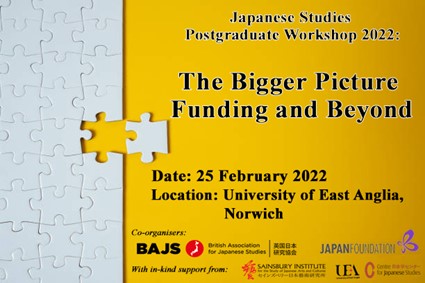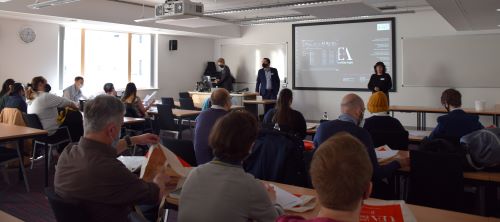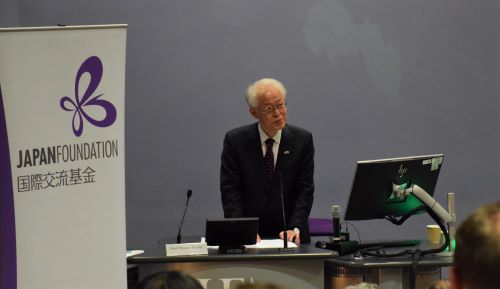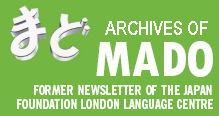10/03/2022

This year The Japan Foundation and The British Association for Japanese Studies were able to come together again in person for the 11th Postgraduate Japanese Studies Workshop. This time the event was held at the University of East Anglia. Students who had waited two years to gather face to face came from across the UK from a variety of institutions. The day involved lectures, presentations, and plenty of networking opportunities. The workshop’s aim this year was to provide students with help and advice on funding opportunities.

The first session was a student presentation session. Broken into separate groups, students had the opportunity to present their research to their peers. The students took on the challenging task of introducing their subject matter and research objectives within a short time frame. For many, it was the first time presenting their ideas in-person. It was great to hear such passionate and varied presentations from those who were at varying stages in their research. They then received feedback from both their peers as well as from academics in their field, with a broad range of expertise.
During lunch, it was inspiring to see students engaging in lively discussions, networking, and sharing comments and ideas for each other’s research, with people both inside and outside their own research areas.
After lunch, the students gathered in the Thomas Paine Lecture Theatre for session two. Dr Christopher Hood (Cardiff University, president of BAJS), kicked off the presentations. Dr Hood guided students through the various shapes that collaboration can form, and how to undertake collaborative work alongside individual research. Next, Dr Jennifer Coates from the University of Sheffield and BAJS took the podium. With multiple case studies of her own experiences, and advice on how to write successful funding applications, Dr Coates gave the students in-depth and personal insights into the often-overwhelming process of applying for funding.
For the third session of the day, representatives from The Daiwa Anglo-Japanese Foundation and The Great Britain Sasakawa Foundation joined the organisers to introduce the funding opportunities that are available at their organisations, aimed specifically at students in Japanese Studies.

Session four saw Professor Simon Kaner on the podium as keynote speaker. As the Executive Director of SISJAC (Sainsbury Institute for the Study of Japanese Arts and Culture) and Director of the Centre for Japanese Studies at UEA, Professor Kaner was the perfect speaker to give students his expertise on large-scale funding, including how smaller grants can build up to receiving larger ones in the future, and how to keep a track of the reach and impact of your publications. Professor Kaner’s talk was followed by a Q&A session with the panel of assembled academics. Questions ranged from funding to job opportunities within the Japanese Studies sector. With a panel consisting of academics from different disciplines and backgrounds, each question had in depth answers.

For the final session of the day, the attendees at the workshop had the immense honour of welcoming Ambassador Hayashi from The Embassy of Japan in the UK. Ambassador Hayashi gave an impassioned and encouraging speech acknowledging the importance of the relationship between Japan, the UK, and the rest of the world. He thanked all students and other attendees for their continued dedication to their work and laid out the embassy’s vision for increased multicultural exchange. It was a privilege to hear the ambassador speak and provided encouragement for all attendees after such a tumultuous two years. After the final session, there was a sake and sushi reception for all the attendees, academics, and representatives to get together and network and discuss the day’s events.
The Japan Foundation would like to thank the British Association for Japanese Studies for all their efforts in co-organising this event as well as the academics for giving up their valuable time. We would also like to thank the University of East Anglia and the Sainsbury Institute for Japanese Arts and Culture for their hard work and assistance in hosting the event. Thank you to all the funding institutions (The Daiwa Anglo-Japanese Foundation and The Great Britain Sasakawa Foundation) and The Embassy of Japan in the UK who spoke in the final session, and a special thanks to the students for making our first event in two years so memorable.



 Japanese Studies & International Dialogue Navigation
Japanese Studies & International Dialogue Navigation
